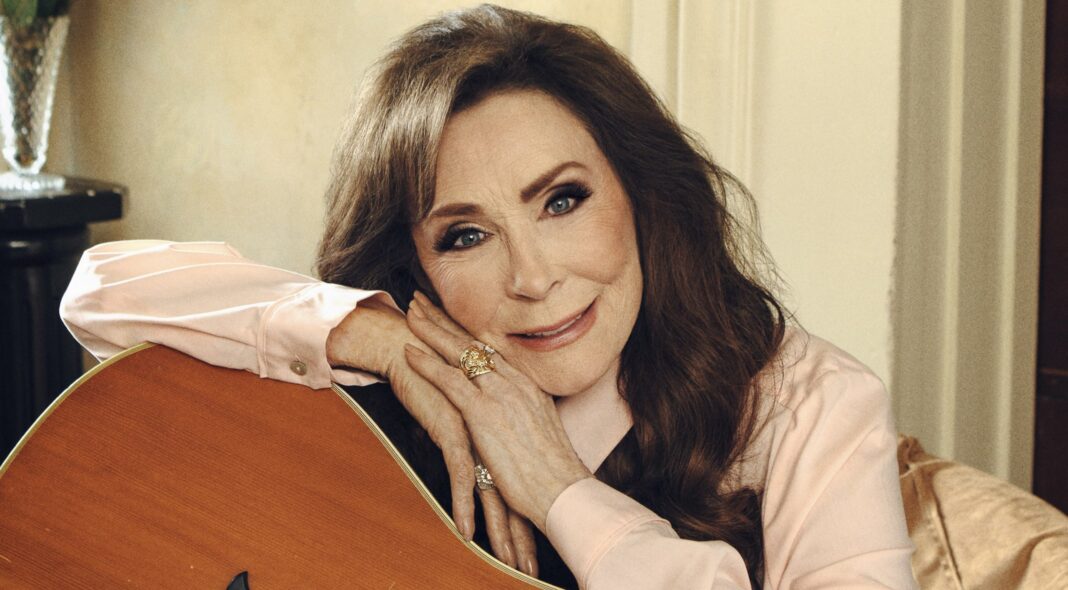Loretta Lynn didn’t even know what the country music chart was until her debut single ‘Honky Tonk Girl’ hit number 14 in the summer of 1960. She and her husband famously drove from radio station to radio station, demanding airplay: a tireless act of self-promotion that sparked her sixty-years-and-counting career as a country music legend. To this day, Lynn never roams far from the charts.
A new version of ‘Honky Tonk Girl’ appears on Lynn’s fiftieth album, ‘Still Woman Enough’. Produced by her daughter, Patsy Lynn Russell, and John Carter Cash, the album shares its name with Lynn’s 2002 memoir. ‘Still Woman Enough’ is also the only brand-new song, among reinterpretations of country standards, songs by the Carter Family and Hank Williams, and Lynn’s own iconic hits. The tracks stretch back into the past, but the album’s guests run the gamut of current and future generations, from Tanya Tucker and Reba McEntire to Carrie Underwood and Margo Price – and though Lynn may be nearly ninety, she’s daring them to keep up.
On ‘Keep on the Sunny Side’, popularised by the Carters in the twenties, Lynn sings, “There’s a dark and a troubled side of life / There’s a bright and a sunny side too”. The phrase might well sum up all of country music, and it certainly relates to the facades Lynn’s dissected throughout her career, from the masked heartbreak of ‘I’ll Be All Smiles Tonight’ to the false realities of celebrity in ‘One’s On The Way’.
The latter track, on which she duets with Margo Price, exposes disparities within female experience in seventies America, from film stars and feminists to housewives. “The girls in New York City / They all march for women’s lib / Better Homes and Gardens shows / A modern way to live,” Lynn sings, but meanwhile the floor still needs scrubbing and the children need tending to. In 1975, three years after penning these lines, her controversial song ‘The Pill’ was notoriously banned from country radio. “I’m makin’ up for all those years / Since I’ve got the pill,” she sang: she married at thirteen and became a mother at fourteen. Her music spoke up for ordinary working-class women, who could not always relate to urban white middle-class feminists: their new freedoms hadn’t reached rural mining towns like Lynn’s Kentucky home, Butcher Hollow.
Fifty years on, these issues still find relevance, particularly at a time of dishearteningly stalled progress. And while it’s often startling to hear an older voice sing the words of their younger self, Lynn’s continued steeliness and humour keep despondency at bay. The album’s simple acoustic arrangements elevate the gravelly grandeur of her voice – like 1970 track ‘Coal Miner’s Daughter’, stripped and slowed to a banjo-accompanied recitation. In the updated video, Lynn sits resplendent in sequins and lipstick, contemplating her current splendour amid the rustic rooms of her upbringing. The scenes are similar to Johnny Cash’s ‘Hurt’, but instead of devastation, she exudes a dignified reflective power.
The record opens with ‘Still Woman Enough’ and closes with Lynn’s 1966 hit ‘You Ain’t Woman Enough’, a challenge to all who follow in her wake, and a reminder to keep your foot on the gas – for if her work isn’t done yet, neither is yours. A gutsy, late-career flourish, ‘Still Woman Enough’ celebrates a life still being lived, rather than eulogising one passed. And what a precious gift to be able to do so, in an industry, genre, and era dominated by heartbreak and loss.


